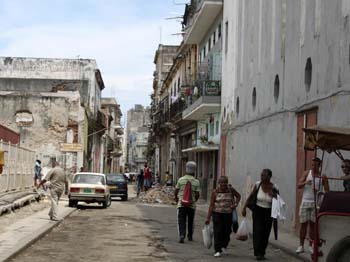 |
Socio-Political Issues
Liberalism, Socialism, Feudalism - III
The Fiasco of Socialism &
Basics on Catholic Authority
Plinio Corrêa de Oliveira
Neither the liberals, as we have seen in previous articles (here & here), nor the socialists saw their errors because they were completely obsessed by the principles of the French Revolution - liberty, equality and fraternity - which are fundamentally false when applied to reality. Before these theories are applied, they look beautiful; but afterwards, they result in disaster.
What are the failures of Socialism? There are many. For example, the decline of production is one of its consequences. In socialist countries, production declines because there are no incentives to progress.
Imagine a computer designer working in a non-socialist country. He knows that if he works many hours a day, he will be rewarded for his efforts by being well paid. He also knows that if he works well for some years, he has a good chance of being promoted and moving up in the company. He knows further that his reputation will grow and other companies will be interested in employing him. Therefore, his company directors will give him what he wants in order to keep him, and he can impose his own conditions and salary.

Communism has produced poverty and misery in Cuba |
Now imagine the same worker in a socialist country. He has a fixed salary and knows that no matter how much he works, he will never receive more than that amount because Socialism levels all salaries. The result: he will never make any special effort to progress or do extra work because there is no stimulus. He will work the minimum that he can. The normal rule in Socialist countries is for the worker to cheat the State and do the least amount of work possible.
I recently met a man who is considered the best technician in Brazil in his field. He is around 50 years old and had a quite relaxed and tranquil face.
I asked him: “Mr. X, are you on vacation?” He answered, “Yes, I am now on a permanent vacation.”
He explained to me that he used to have a very good job with a high salary. But after the recent socialist law was approved placing a super-tax on high salaries, an enormous percentage of his salary would be going to the government in taxes. In effect he would be working primarily for the State. So, since he had saved during his career, he decided to quit his job to not incur these new taxes. He no longer works, but is retired and spending time with his wife and daughter visiting other countries on excursions.
His situation is a characteristic fruit of Socialism – he preferred to retire rather than keep working only for the State. Thus, Brazil lost its best technician in that field because of the socialist legislation it approved.
In officially socialist countries, it is still worse: there are no promotions, the salaries are equal, no one wants to work hard. The inevitable consequence is that production falls. This is one reason for the continuous poverty in Communist countries. It is the result of the fiasco of equality when it is put into practice.
Notwithstanding, communists continue to impose the myth of equality upon all who are under their rule and want to force it on the entire world. It is a religious fanaticism, even though Communism pretends it is not a religion.
Catholic presuppositions
Now let us look at the position of the Catholic Church in face of these problems.
My intention here is not to give a course on these topics, but to give you some general guidelines to invite you to study in order to learn the complete panorama.
What does the Church thinks about liberty/Liberalism and equality/Socialism?

In Paradise Adam and Eve had dominion over animals and nature |
The Church instructs us that man was created by God in Paradise with the need for an authority. If Adam and Eve had not sinned, mankind still would have had a government, founded cities and established a culture and a civilization. Mankind would have done many of the things it did after original sin. Some things in our present day culture would not have existed, as, for example, medicine, since man would neither get sick nor suffer death. But there would be many other things that would be similar. For example, man would work, not from the need to provide for himself and family, but for the joy of expressing his personality.
On the other hand, in Paradise man had an extraordinary knowledge of nature and complete dominion over it. You know that Adam understood the deepest aspect of each animal; after he was created, all the animals passed before him and he gave each one the name that properly defined it according to its nature and species. Further, the animals were not hostile to man. I believe it is Anna Catherine Emmerick who says that the noblest animals – the lion, tiger, jaguar, leopard, etc - were the ones who were closest to man, and they only became the most hostile as a punishment for man’s sin. Therefore, everything was in perfect order.
This would establish a life completely different in many aspects from our present one, but men would still organize society, create a civilization, found cities and other institutions to better arrange their lives.
Now then, even with man’s great intelligence and upright will in the state of pure nature and with the additional assistance and support of grace, the Church teaches us that an authority would be needed. The authority would not be to suppress crimes, but to command.
This is understandable since men have different perspectives depending on their individual spheres of interests, and it is necessary for some men to consider the collective as a whole. It is indispensable to have some men who are concerned about the common good, not just their private good, and to instruct the others on how to act so that harmony will reign in the whole society.

The efficient and well planned Sao Paulo metro |
To comprehend this, you may take the simple example of our city, São Paulo. The authority does not exist only to prevent crime, but also to provide for the common good. How could we have a metro if an authority did not exist? Someone had to study the transportation needs of the population, design a plan for the metro lines, purchase the properties for the stations, and then actually undertake the work of digging miles and miles of tunnels under the city, set the rails for the trains and establish the controls for them to run well.
To carry out this project, the authority of the mayor, the design of an urban planner and a whole army of engineers and workers are necessary. An authority is absolutely indispensable to coordinate the minds and wills to accomplish something for the common good.
This is the nature of things created by God - either in Paradise or outside of it - in our present life with the effects of original sin. We need to have an authority and to respect it.
Thus, we ask ourselves: What are the characteristics of this authority that keep it from falling into the abuses of Liberalism or Socialism?
We will study this topic in the next article.
Continued

Posted April 18, 2012

Related Topics of Interest
 Discussing Liberal & Socialist Democracies Discussing Liberal & Socialist Democracies
 Socialism Exploits Liberalism’s Flaws Socialism Exploits Liberalism’s Flaws
 Critique of Capitalism from an Organic Perspective Critique of Capitalism from an Organic Perspective
 The Socialist Perspective The Socialist Perspective
 A Socialist West? When? A Socialist West? When?
 Organic versus Revolutionary Progress Organic versus Revolutionary Progress
 Liberals, Modernists and Progressivists Liberals, Modernists and Progressivists

Related Works of Interest
|
|
Social-Political | Hot Topics | Home | Books | CDs | Search | Contact Us | Donate

© 2002- Tradition in Action, Inc. All Rights
Reserved
|
 |
|